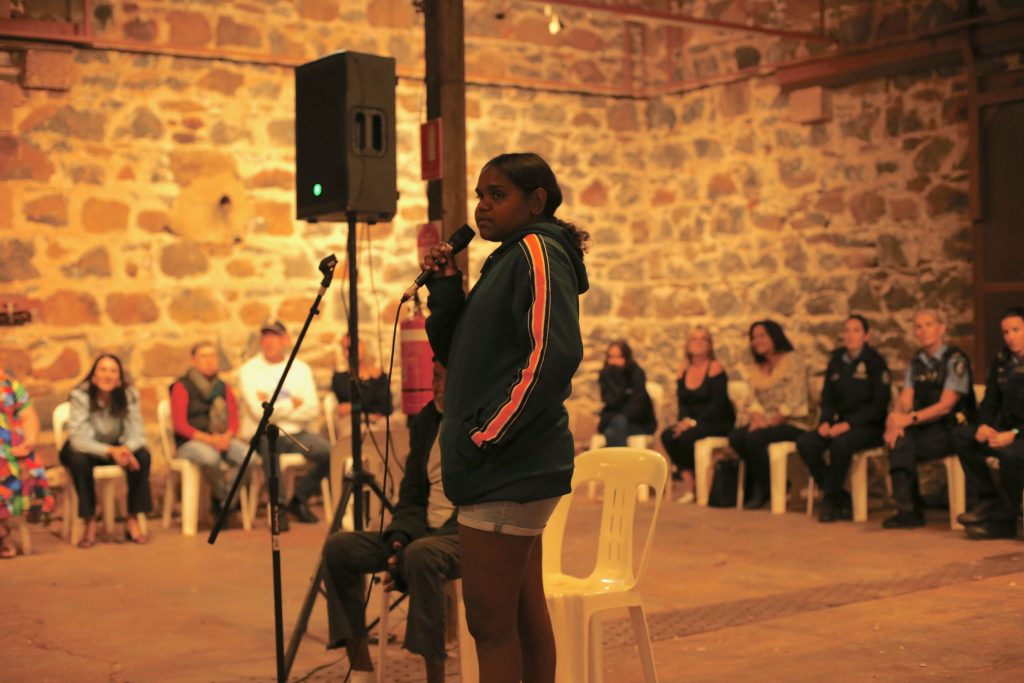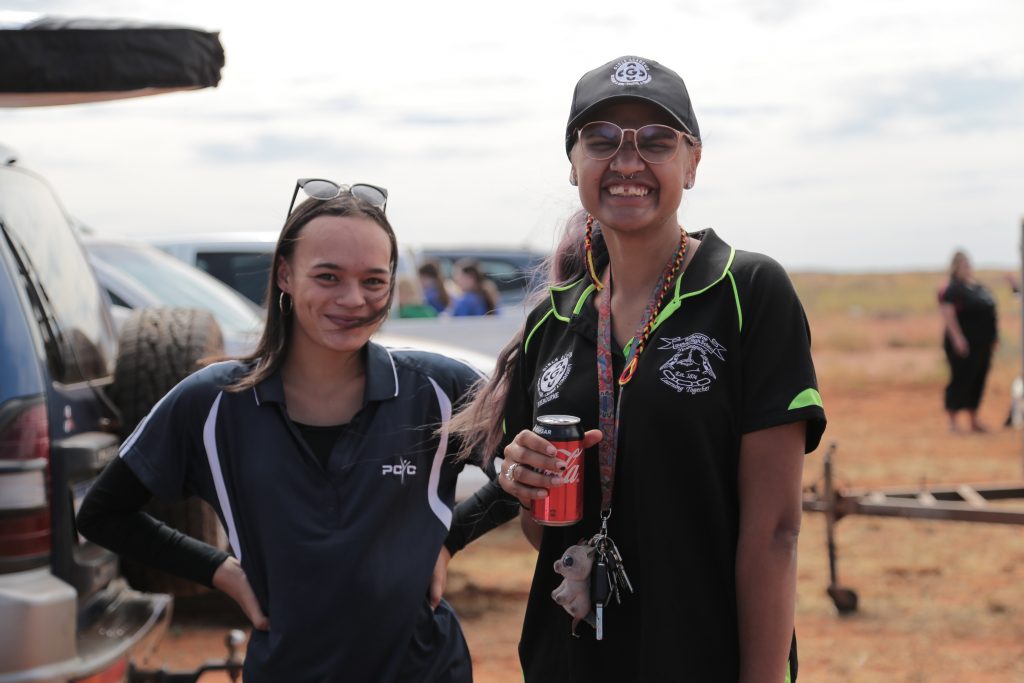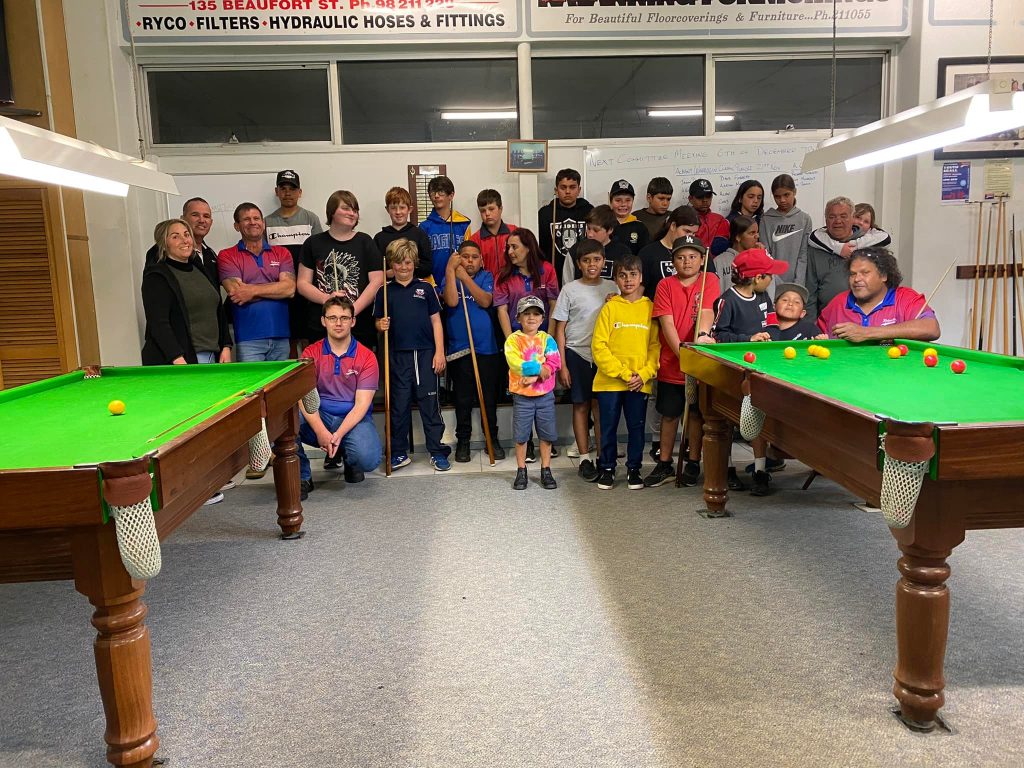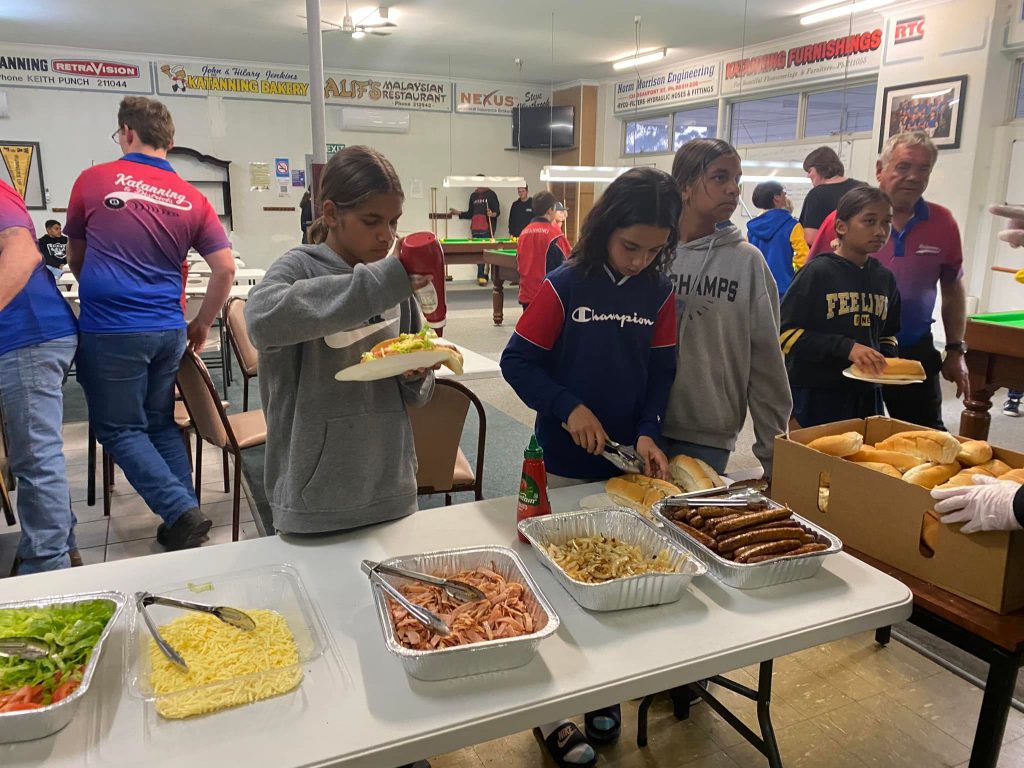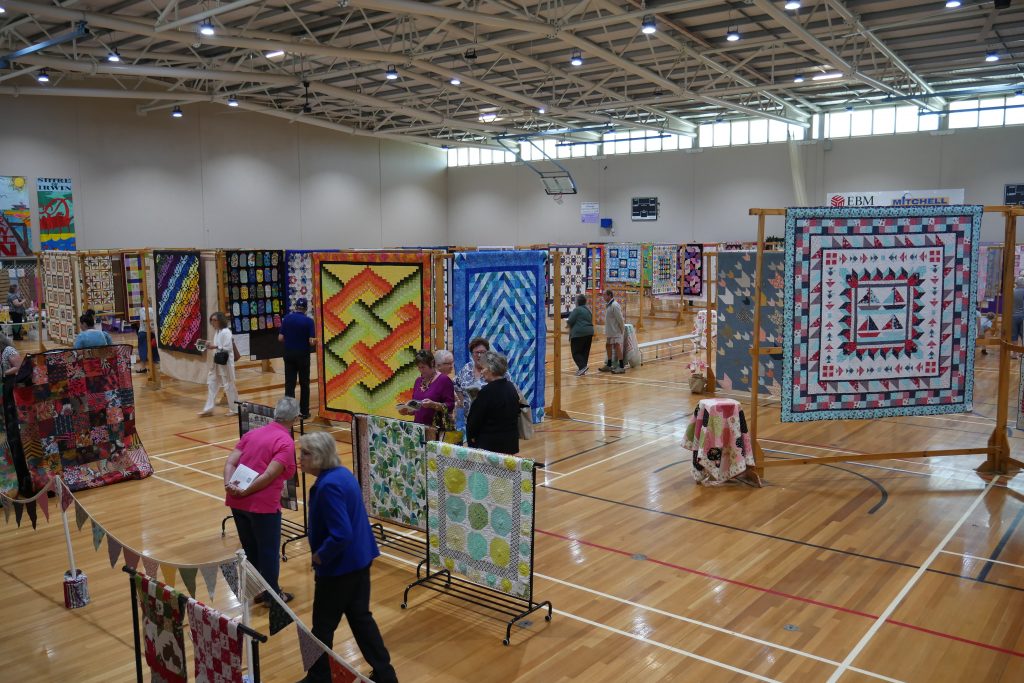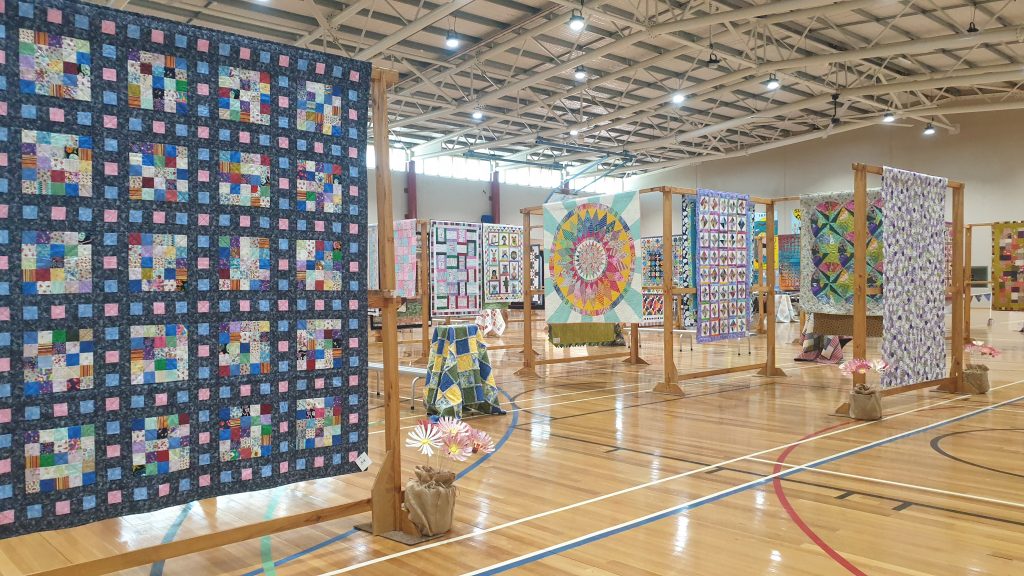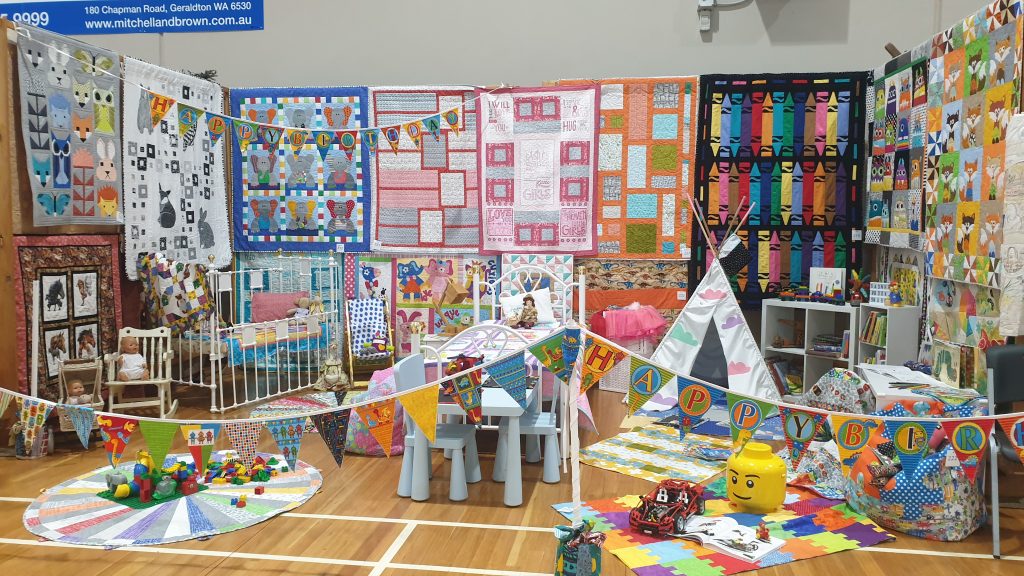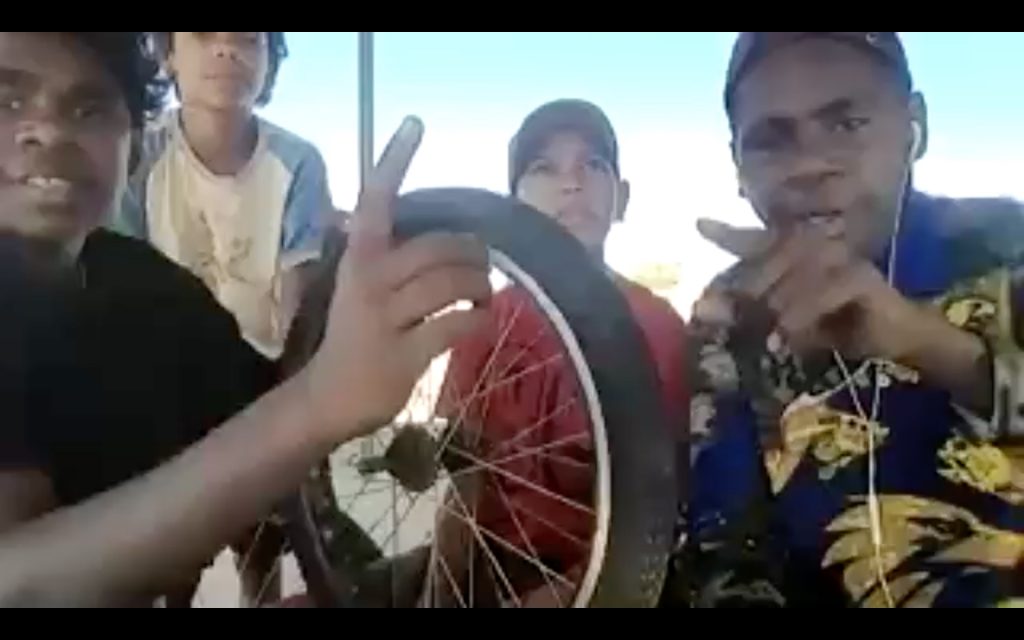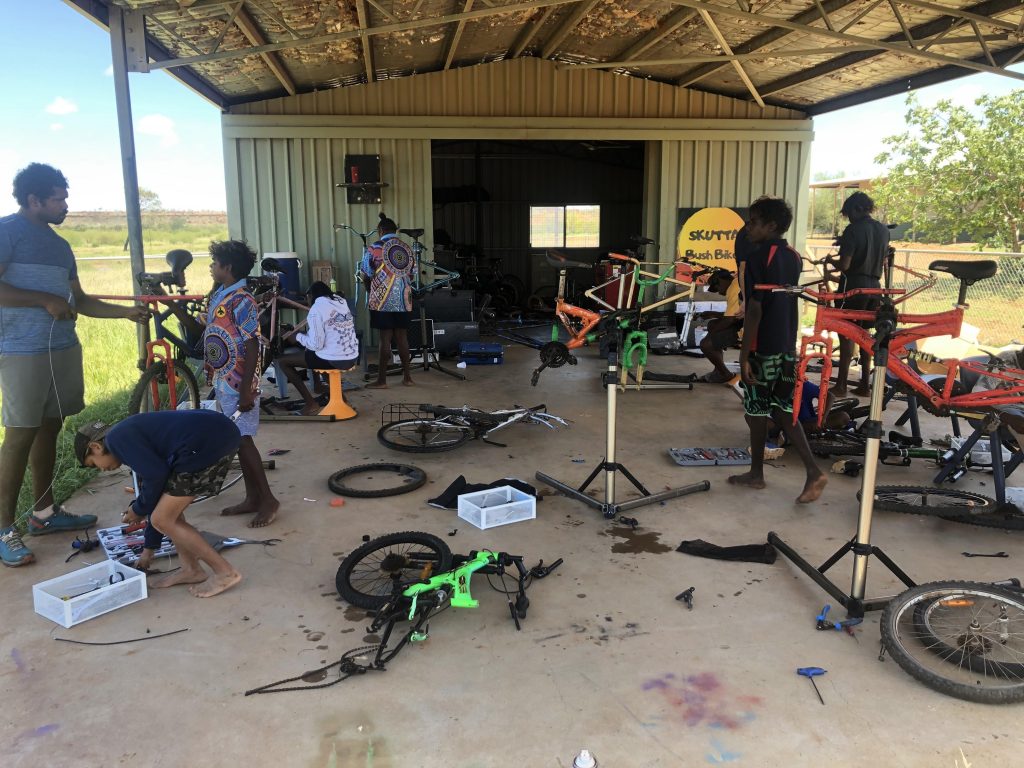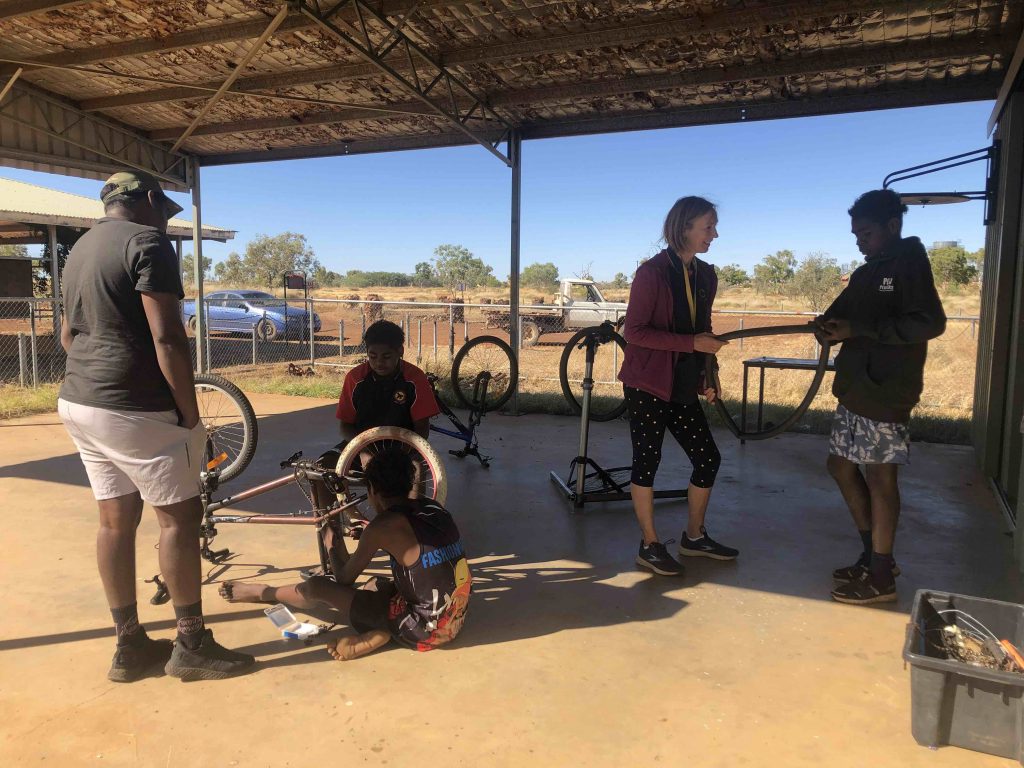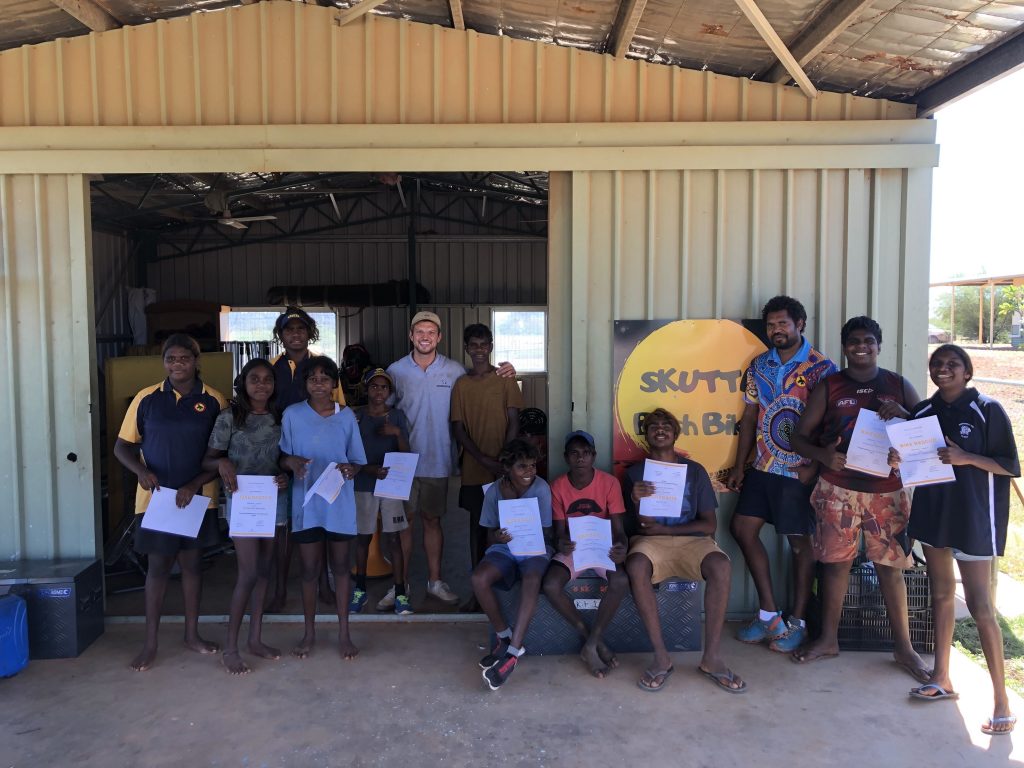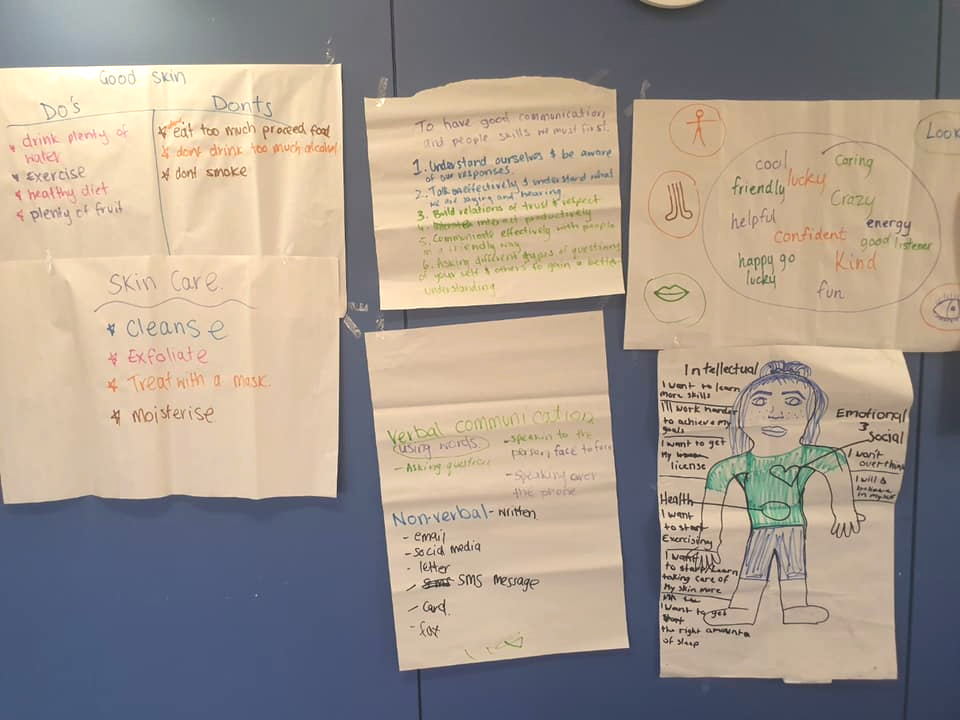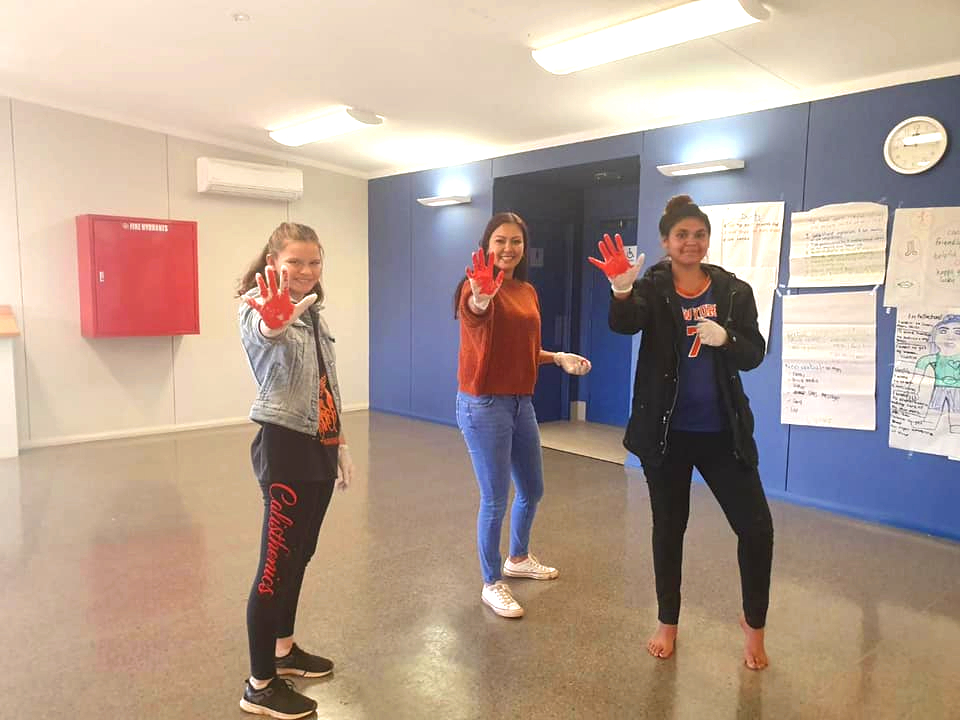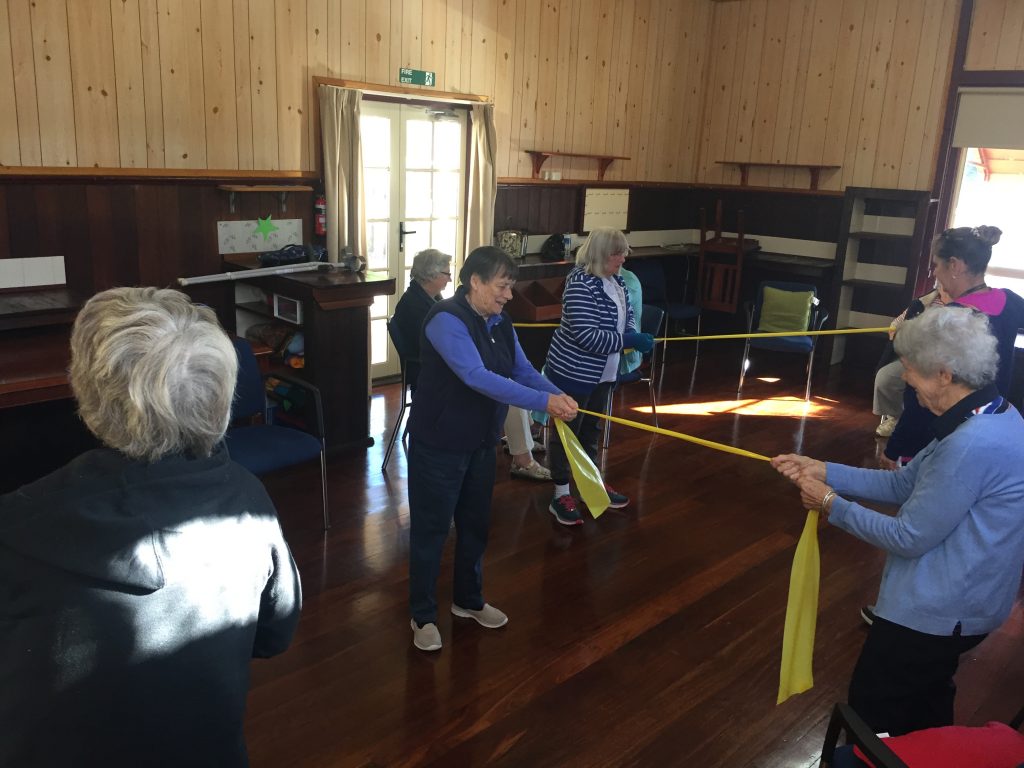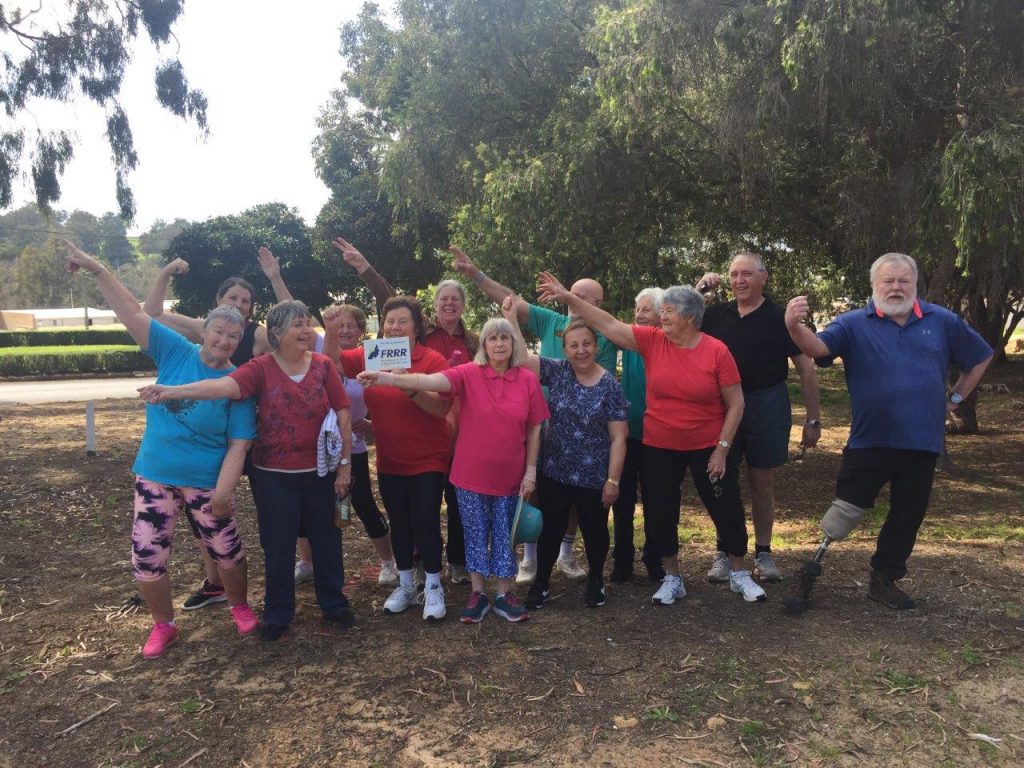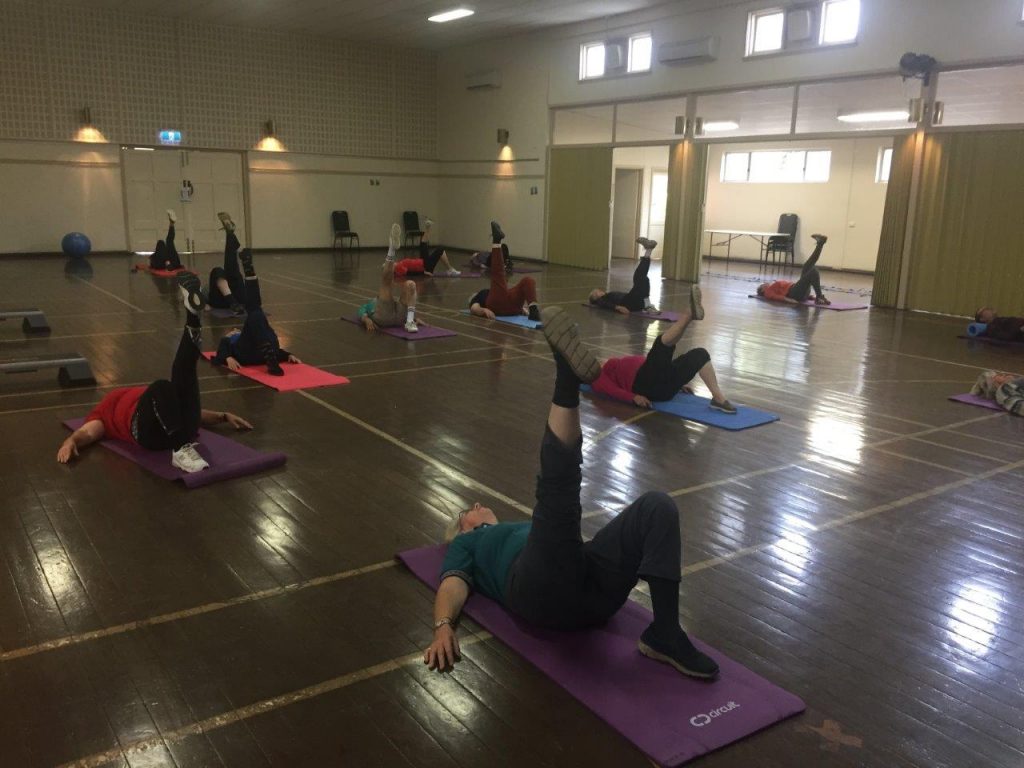Foundation for Rural & Regional Renewal (FRRR)
On Ngarluma Country
Roebourne is a town in the Pilbara region of WA with a largely Aboriginal population. Police have observed a real gap in meaningful engagement with the youth of this community and a lack of opportunities to build their skills, confidence and positive decision making.
Big hART is an organisation that uses art as a catalyst for change. Over the years, Big hART has demonstrated its ability to engage and work strongly with young people and across different levels of community, with strong outcomes as a result. Their grassroots style of engagement, working directly with young people, has a huge impact on the social and community issues that face Roebourne as an Aboriginal community. The outcomes of the many programs, workshops and high production value events that have been created in partnership with Big hART have been profoundly life changing for many young people in the community.
Young people in the Pilbara have created a future focused, ground breaking digital education resource that celebrates living culture and supports teachers with an energetic mode of online learning. In 2020, Big hART received a $10,000 grant from the Westpac Foundation Community Grants program to train and create paid employment for four young adults in the Pilbara to deliver this Indigenous education resource live to classrooms nationally.
Known as the NEO-Learning project, Big hART created tailored training and professional development opportunities for the four trainees, who were individually mentored with a view to longer term employment, to deliver the NEO-Learning resource to schools nationally. The traineeships offered tangible career paths giving them strong digital skillsets and practical industry experience that included digital drawing and music delivery skill building, virtual education delivery, media and communications, and presenting and public speaking. These activities and tasks were mentored by professional producers and creative industry practitioners, through a task focused workshop program.
The outcomes from the project exceeded expectations, with incredible results for some of the trainees, one of whom was Simara, a young Aboriginal woman from Roebourne. She was part of the digital training program, and said that during the program, she grew in confidence and felt excited for her future and career path.
Sam Hawker is the National Producer for Big hART. She said that while creating peer to peer educational content, Simara displayed an excellent eye for framing and observation.
“We have been able to foster her passion for photography over the last 12 months, providing opportunity for Simara to build technical skills and refine her creative practice. To amplify her achievements, we delivered professional development workshops, leading to her art being selected at the prestigious Revealed Exhibition hosted by Fremantle Arts Centre in Perth. Big hART supported Simara throughout this process, from initial conversations with Fremantle Arts Centre to the development of an artist statement, workshops on licensing, contracts and payments. Over the course of the Exhibition, all of Simara’s artworks sold, including one being purchased by the WA State Government for display in Dumas House in Perth.
“As Simara’s confidence in photography continues to grow, she has become a very important role model and mentor for her peers and community.”
Simara also completed media training under the mentorship of Big hART’s Media Manager and implemented this training in conducting interviews with her community. Big hART also helped Simara to obtain her Driver’s License, an essential qualification for employment in the region.
“Being employed as a trainee with Big hART was a great experience for me, as I gained a lot from supporting children and being a mentor and leader for them… this work helped me learn my identity and aspirations. It has made me look for other challenges and opportunities in my life,” Simara said.
For more inspiring stories like this, head to our FY 2021/22 Annual Review.
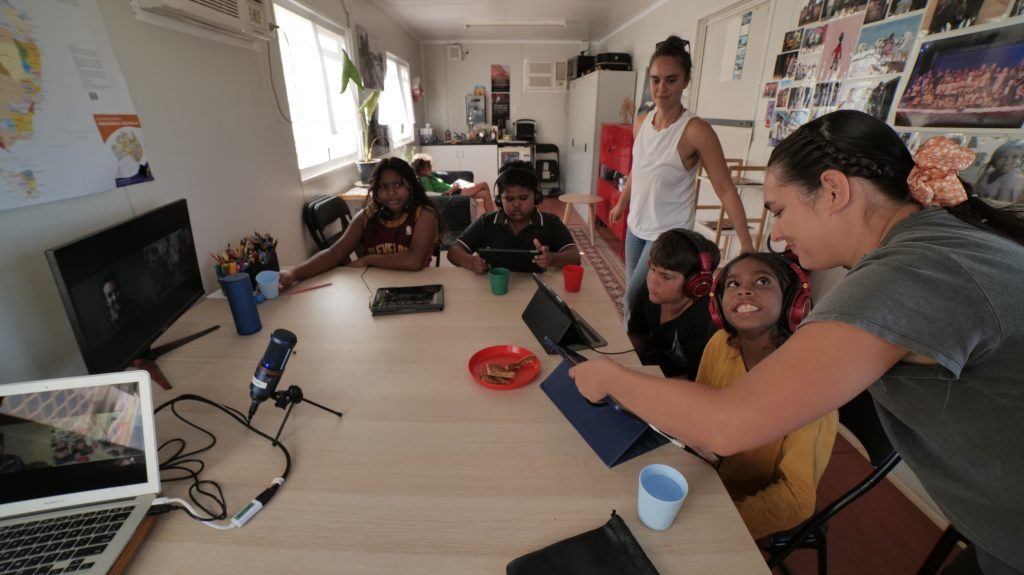
The small regional town of Katanning, in the ‘heart’ of the Great Southern agricultural region, 287 kilometres south-east of Perth in WA, has a shire population of just 4,200 people. While the area is essentially known for agriculture, the town is a regional centre that offers a range of government, health and education services. The Katanning community also prides itself on its multicultural diversity.
This small community was impacted by a bushfire in February 2020, with rebuilding efforts hampered by lockdowns soon after. The community identified that it needed to find ways to engage their younger residents and keep them connected and supported.
The Katanning and Districts Pool Association Incorporated partnered with the Katanning Hub Community Resource Centre (CRC) and the Shire of Katanning to run a Youth program, inviting young people on a Friday night to come to their pool hall to socialise, learn new skills and share a meal. The program has been an overwhelming success with 35-40 young people attending each week.
The hall opened in the late 80s and did not include any kitchen facilities. Requests to use the hall from other community groups had been slowly increasing, as it is one of only a few indoor spaces available in Katanning. Providing catering facilities would make the venue a more suitable location to support these additional groups and their events. With the changing nature of the activities held at the hall, it was time for a refresh. To create a more usable space for community groups to meet, it was decided to add a kitchen area to better support the Youth program in preparing and serving these meals.
Other groups that use the hall were also supportive, including the local men’s group who expressed support for a kitchenette to make a cuppa and make their own events more welcoming for its members.
Thanks to a $10,000 Strengthening Rural Communities grant, funded by IKEA Australia, the Katanning and Districts Pool Association was able to revamp the ageing pool hall and add a meal preparation and serving area.
Local volunteers provided amazing support for the project, contributing more than 80 hours of labour to the renovations and 20 hours to fundraising each month, ensuring the project’s success.
Since finalising the renovation works, the association’s membership has increased, volunteers have been inspired to become more active and the use of the hall by other community groups has expanded. With the improved facilities making the hall more welcoming, friendly and a safe space for people of all ages, the Katanning community is feeling more connected with access to a space tailored to enjoy each other’s company.
The Katanning Police now drop by during the Youth program and challenge the young people to a game, further strengthening these important relationships. Badgebup Aboriginal cooperation is interested in partnering to deliver the Youth program into the future and the Katanning community are proud of what has been achieved, voicing it regularly in person and via social media.
Nine projects funded across NSW, QLD and WA
While drought is out of the media spotlight, for many communities it is still a very real and significant issue. FRRR’s Tackling Tough Times Together (TTTT) program has just awarded $86,083 to nine community initiatives in remote, rural and regional communities across Australia still dealing with the impacts of drought.
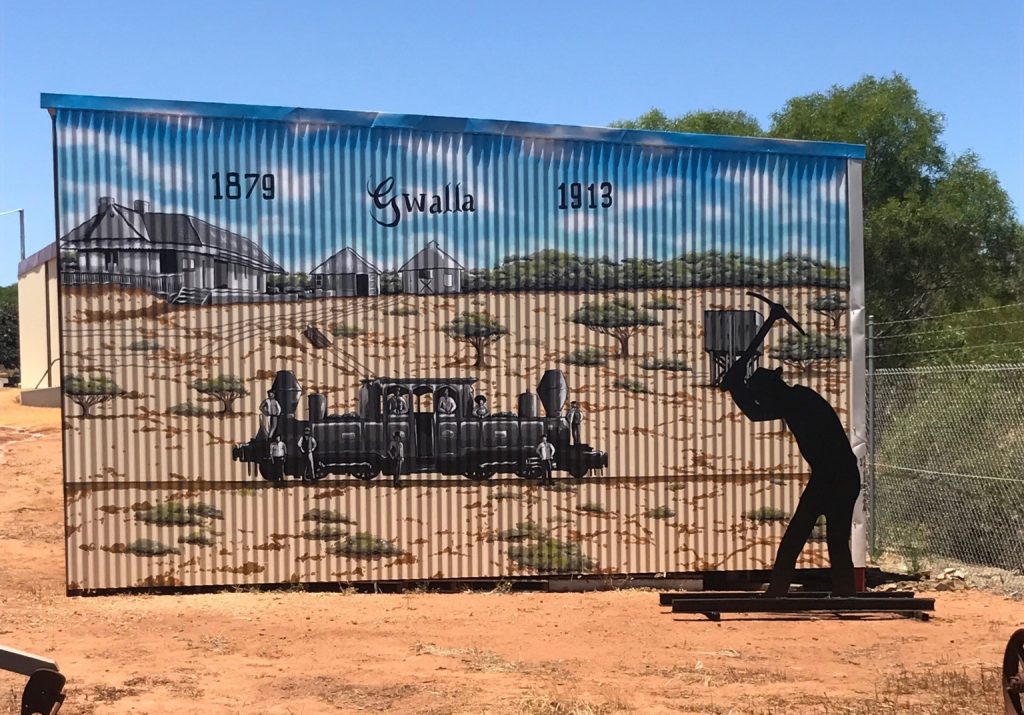
TTTT is a long-running, collaboratively-funded program that helps drought-affected communities to access the funding and resources they need to tackle the long-term impacts of drought. This round of grants will help fund a variety of projects run by local not-for-profit organisations and community groups, including a series of art workshops for both adults and children, a community event featuring Aboriginal artwork, the creation of murals and skills training to support community members experiencing loss and grief.
Nina O’Brien, FRRR’s Disaster Resilience and Recovery Lead, said that there are still many regions across Australia being impacted by drought.
“During this round of grants, the number of eligible LGAs dropped from 152 to 47. While we’re delighted to see such a significant drop in the number of communities being impacted by drought, it’s crucial that we continue to provide support. A lot of places, like remote SA, are still tackling extreme periods of dryness while others are very much still in drought recovery mode. Not to mention the fact that communities are dealing with a variety of other factors as they continue to stand strong and keep their community connected and supported.
“In this round of applications, we saw a lot of projects that are aiming to improve volunteer capacity and build a sense of social connectedness. If the last two years have taught us anything, it’s that our remote, rural and regional communities need volunteers and a strong sense of community in order to thrive.
“When we carried out our Heartbeat of Rural Australia survey last year, the results showed that the effects of drought, as well as the cumulative effects of multiple other disasters, have left volunteers feeling extremely fatigued, and those living in rural communities feeling isolated. That’s why we’re so pleased to be able to fund these kinds of grassroots initiatives at a time when they’re truly needed,” Ms O’Brien said.
Among the other projects funded this round were:
- Red Ridge Ltd – Longreach, QLD – Outback Fashion Festival – Canvas to Catwalk – Provide opportunities for Aboriginal artists from seven outback Queensland communities to participate in fashion print design workshops which culminate in a catwalk runway community event. $10,000
- Rattler Railway Company Ltd – Gympie, QLD – Fatigue Management Accommodation- Build the capacity, capability, and sustainability of Rattler Railway Company Ltd through infrastructure restoration and renovation to support volunteers. $10,000
- For a Better Chapman Valley (FABCV) Incorporated – Chapman Valley & Nabawa, WA – Winter Art Series in Chapman Valley – Facilitate social connection and enhance opportunities for the Chapman Valley community to participate in creative activities through the delivery of art workshops. $7,900
The full list of grant recipients and their projects is listed on the FRRR website.
The TTTT program supports drought-affected regions of Australia by giving community groups and local not-for-profit organisations access to the resources they need to respond to, and recover from, long-term rainfall deficiencies. This program has granted over $18 million to initiatives that are helping communities to tackle the tough times that come with drought.
Funding for this program is generously contributed by the Tim Fairfax Family Foundation, Pratt Foundation, Stockland CARE Foundation, Paul Ramsay Foundation, The Snow Foundation, Henroth Group and private donors from across the nation. To join these donors, and support grants like this through FRRR, you can make a tax-deductible donation at frrr.org.au/giving/.
The full list of grant recipients and their projects are below.
| Organisation | Project | Location | Grant | |||
|---|---|---|---|---|---|---|
| NEW SOUTH WALES | ||||||
| Moama and District Pre-School Centre Inc | Moama & District Preschool Brings Sober in the Country to Moama Improve the community’s social and emotional health and encourage local involvement by hosting a community dinner and guest speaker on drinking culture and supporting healthy choices. | Moama | $9,150 | |||
| QUEENSLAND | ||||||
| Congregation of Central Western Qld UCA | Edgely Hall Improvements Improve volunteer vitality and support social connection by installing air-conditioning in the multi-purpose room of the Longreach Uniting Church. | Longreach | $10,000 | |||
| Red Ridge (Interior Queensland) Limited | Outback Fashion Festival - Canvas to Catwalk Provide opportunities for Aboriginal artists from seven outback Queensland communities to participate in fashion print design workshops which culminate in a catwalk runway community event. | Longreach | $10,000 | |||
| Rattler Railway Company Ltd | Fatigue Management Accommodation Build the capacity, capability, and sustainability of Rattler Railway Company Ltd through infrastructure restoration and renovation to support volunteers. | Gympie | $10,000 | |||
| Kumbia & District Memorial School of Arts Inc | Kumbia & District School Memorial of Arts Inc Hall Improvements Boost and strengthen the local economy and reduce social isolation with town beautification in Kumbia through mural art. | Kumbia | $10,000 | |||
| Connecting Communities Australia Ltd | Let the Show Go On Improve volunteer vitality and support strong social connection by providing a team of volunteers to assist the Longreach Show Committee prepare and coordinate the Longreach Annual Show. | Longreach | $9,933 | |||
| WESTERN AUSTRALIA | ||||||
| The Isolated Childrens' Parents Association of (WA) Inc | 2022 ICPA Federal Conference Build communities’ resilience to continue to face the many ongoing issues and uncertainties that are inherent for families living in rural and remote Australia by hosting a conference where participants connect and learn from one another. | Various | $10,000 | |||
| Busselton Hospice Care Incorporated | Increasing the Capability to Support Grief and Bereavement in our Compassionate Community Empower a community group by providing skills training and capacity building to further support community members experiencing loss and grief. | Busselton | $9,100 | |||
| For a Better Chapman Valley (FABCV) Incorporated | Winter Art Series in Chapman Valley Facilitate social connection and enhance opportunities for the Chapman Valley community to participate in creative activities through the delivery of art workshops. | Nabawa | $7,900 | |||
The Dongara Patchwork Club meet in the WA fishing town of Port Denison, which is located almost four hours north of Perth. Every three years, the club hosts a ‘Hanging of the Quilts’ event to exhibit new works completed by club members and the event draws tourists into town, supporting the local arts economy.
In October 2019, the Dongara Patchwork Club used a $4,403 Strengthening Rural Communities grant to fund the event. The grant was used to support venue hire, catering, printing, raffle tickets and advertising. The club members transformed the stadium at the Rec Centre into a Quilters Haven for the day and created ‘themed rooms’ that helped visitors to get inspired, be introduced to the craft or just to appreciate the talents of the local quilters.
The event featured quilts that had never been displayed, as well as demonstrations, art displays, raffles, quality market stalls, and a vintage car display that was located adjacent to the building. The 2019 ‘Hanging of the Quilts’ event also provided an opportunity for other local community groups to get involved, with the Veteran Car Club, Dongara Denison Art Group, Geraldton Spinners/weavers and Lace Makers and the Pottery Club participating along with local producers who showcased their wares.
Not only did the event drive local arts tourism but the community also reported an increase in creative expression, strengthened social connectivity and reduced social isolation. The funds raised at the festival were enough to cover the groups running costs and their work within the community for the next three years.
Gooniyandi Country
The town of Yiyili is located six hours east of Broome in the heart of the Kimberley region. At the town school, 90% of the time, fewer than one third of students are in attendance. This is often due to young people being impacted by intergenerational trauma and grief, family and domestic violence and drug and alcohol abuse, all of which are contributing to poor mental and physical health in the youth of Yiyili.
With engagement in education and work steadily decreasing, last year the Yiyili Aboriginal School decided to start ‘BikeRescue’, a program where young people could attend multiple workshops each week to refurbish and repair second-hand bikes.
Supported with a $25,000 Strengthening Rural Communities grant, funded by John T Reid Charitable Trusts, the training was carried out by Youth Councillors, as well as bicycle maintenance and refurbishment specialists. During the sessions, the students were taught how to adjust gears, fit new brakes, clean and maintain bikes and organise the workshop to function more efficiently. There was also a strong focus on self-management, resilience and self-regulation.
At the end of the program, the students sold the bikes to give them an understanding of how to run a small business. As an added benefit, this meant that there were affordable bikes available to children and adults in the community. The students that participated in the program were also allowed to each keep a bike for themselves.
As a result, the young people were really proud of the bikes they had managed to rescue, and of having invested their time and energy into a productive project. By participating, they also strengthened their community connections and developed more positive attitudes towards school and work.
As an added bonus, community members have been employed by the school on a casual basis to help students run the bicycle repair workshop and the Yiyili community group have secured funding to continue running the program.
Acknowledging the Wongutha people
Goldfields Girl is about leadership, confidence and building aspirational behaviours. Much more than a pageant, it’s a program that involves personal development, work readiness and community engagement activities for young Indigenous women between the ages of 16 and 25 from the Goldfields region, in south eastern corner of Western Australia. It’s based on the successful Kimberley Girl program, and has been operating since 2017.
Goolarri Media Enterprises (the operational arm of Broome Aboriginal Media Association Aboriginal Corporation) is behind the program, which is part of the overarching Young Women’s Pathways Program, helping young Indigenous women to realise their self-worth, gain confidence to dream big and to build goal setting behaviours.
In 2020, Goolarri’s aim for the program was to engage and participate up to 10 young women from Leonora in the program and workshops. Goldfields Girl is a contemporary cultural activity, and in the remote town of Leonora, there is nothing else like it for Indigenous women at this age and stage of life. The work readiness training and leadership development it provides can be transformational, providing a pathway for successfully navigating transition from school to employment. A significant 43.7% of the Pathways Program participants from 2004 to 2015 were employed, compared to 29.8% employment rate across Indigenous women in all of Australia, in the same age range (and this number is known to be much lower in remote areas.)
With funding from the Kapikarnpi Community Fund, FRRR supported the inaugural Goldfields Girl program in 2017 with a $5,000 grant to the Tjupan Ngalia Land Council Aboriginal Corporation. For two years, activities were held in Leonora and Kalgoorlie. In 2019, there were fewer Leonora participants, and so they were brought to Kalgoorlie for the workshops with their travel, accommodation and meal costs covered. But Leonora is a priority site for the program, and Goollarri wanted to support young women from the town, so they didn’t feel isolated because they were many kilometers from their home and Country.
Goolarri sought funds from the Strengthening Rural Communities program to run a series of 10 smaller, non-accredited workshops based in Leonora in the two weeks prior to Goldfields Girl 2020, to keep the young women engaged as much as possible. They were successful and started planning.
With the programs initially locked in for March 2020 delivery, everything fell apart when the country went into lockdown. Suddenly the risk of these young women feeling isolated became even greater. But the organisation was committed to finding a way forward.
Unsure how to proceed and unable to access the Leonora community, Goolarri got the Broome and Kalgoorlie-Leonora teams together on Zoom to determine a way forward. They agreed to commence the program online by filming fun videos to engage the girls in the accredited training. With a small window in which to keep participants engaged, while not ideal, the plan was better than nothing. So, they developed online modules, videos, adapted content and updated COVID plans as the environment changed.
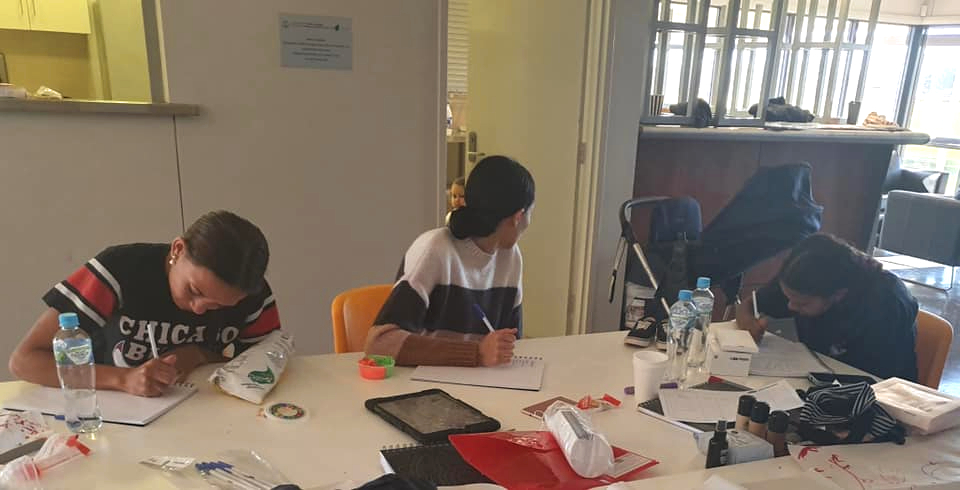
In the final report, the organisation wrote: “We did everything in our power to ensure this project went ahead, to the point where our organisation invested heavily in developing accredited training materials and training videos for the girls, so they did not think we had just walked away and left them.”
“None of it was easy but we did it for the young women.”
Past Leonora participants were trained in the delivery and support of the materials and this was a wonderful outcome that has enabled additional skill sharing for other young women in the community.
“We know from their feedback that these young women gained so much out of this and enabling them through trust in on the ground delivery gave them additional ownership for future activities such as this.”
While they didn’t achieve all the results they had hoped for with this adapted delivery model, they hope that we can make a bigger impact in future years delivering the full program in person.
“We know we touched the lives of those girls who did participate and hope to keep them engaged for future delivery.”
In Boyup Brook, WA, the Community Resource Centre wanted to encourage older locals to keep fit and healthy. Despite the large numbers in the area (49% of community members are over the age of 50) there was no exercise group locally catering to the older age bracket, who are at risk from a sedentary lifestyle which affects their health and puts subsequent pressure on local health services.
With four staff, 48 members and a committee of eight, the Boyup Brook Community Resource Centre (BBCRC) already plays a big part in the health and wellbeing of the community, hosting a visiting chiropractor, running a community garden, offering cancer support information and various other exercise classes.
The Centre applied to FRRR for funding to run a Seniors Exercise and Activity (SEA) Program. They felt the program would improve the cardio-fitness and mobility of elderly community members and fill an unmet need in the town, capturing “a segment of the population who will benefit from movement and activity but who don’t necessarily want to go to a more strenuous class.”
In July 2019, with a $4,419 Strengthening Rural Communities grant funded by the John T Reid Charitable Trusts, arrangements were made for the program to start. The Boyup Brook Town Hall was booked to provide a central, accessible and comfortable venue for participants. Equipment was purchased, and the class was advertised in the Boyup Gazette, on noticeboards in the community, the website, social media and also promoted by word of mouth.
Classes ran from August 2019 until June 2020, and were facilitated by CRC Manager Jodi Nield, who holds a Bachelor of Science (Sports Science) and has many years of experience in conducting similar projects. Through her position and involvement in the community, Jodi already had good rapport with local seniors.
Each session was planned to incorporate a variety of group and individual exercises, games and circuit activities that promoted fitness, flexibility, strength and balance. Participants were encouraged to exercise at their own pace with support from the instructor, and encouragement from fellow participants.
Funding also enabled the production of exercise booklets, which were a key component in enabling participants to continue their exercise at home when classes couldn’t be held face to face due to COVID-19 restrictions. Not everyone returned following the break, but the 40 sessions were still able to be conducted during the term of the project, with an average of 12 people attending each session.
“I am most proud of how the program was diverse and inclusive of disability. One participant was a leg amputee, and another an arm amputee. Others had restricted movement in knees, wrists and shoulders. Some had good levels of physical fitness, whereas others had limited fitness, however all were included in the program with alternative activities provided if required.”
Jodi Nield
Manager, Boyup Brook Community Resource Centre
This project not only improved the fitness and quality of life of these residents, but also their social connections and emotional wellbeing. Ms Nield noted that many of the participants were heading out for coffee following the sessions, and the whole community will indirectly benefit from a more connected and engaged senior demographic.
The township of Leonora is located 230 km north of Kalgoorlie in Western Australia and, like many predominantly Indigenous communities, there is an issue with maintaining school attendance in young children. Currently, there is an imbalance in investment in Indigenous Education Support Programs, with the investment in boys outweighing the investment in girls by a significant number. Increasing school attendance is crucial for young Indigenous women to access greater opportunities at school and beyond.
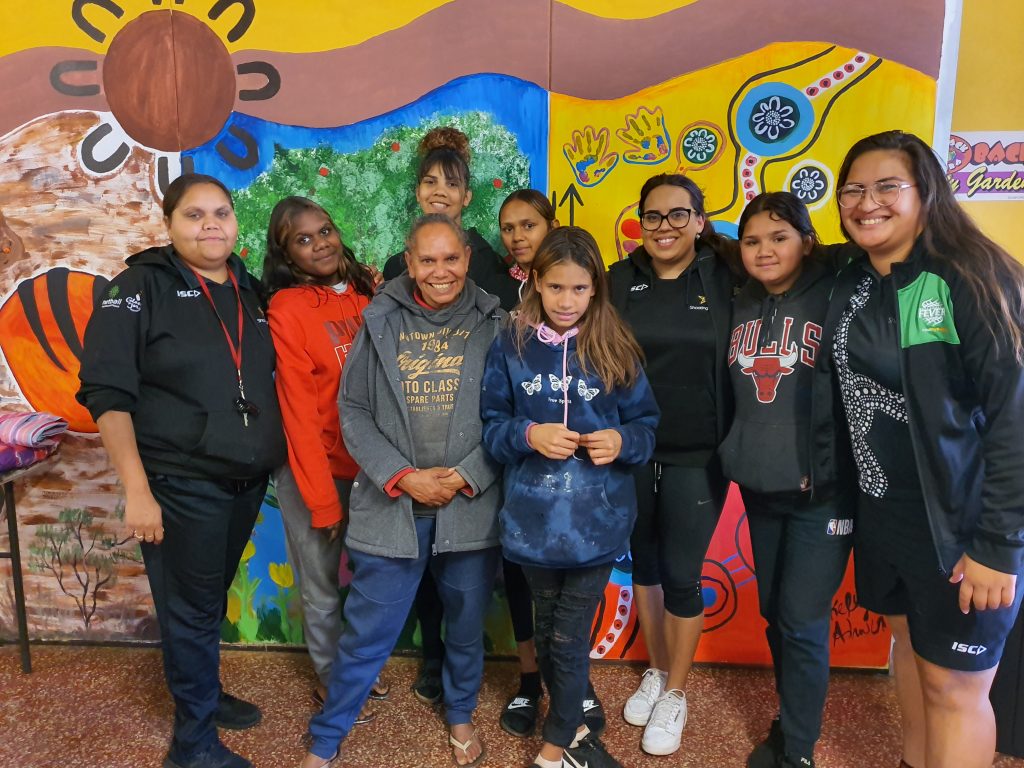
Shooting Stars (SS) is an initiative by Glass Jar Australia and Netball WA that is designed to increase school attendance for Aboriginal and Torres Strait Islander girls living in WA’s remote towns and communities. Through the SS initiative, activities to encourage exercise, positive health and wellbeing, leadership and cultural connection are nourished.
Using a $10,000 Strengthening Rural Communities (SRC) grant through the Small and Vital stream, two Shooting Stars Cultural Reward Camps were able to be funded. Twenty-five girls aged between 10-16 were invited to participate in two activity-based camps on Kija / Jaru Country. In order to participate the girls were required to demonstrate an 80% or above school attendance rate or show an improvement in attendance by 20% or more from the previous term. These requirements not only increase participation at school but also help the girls to feel they have worked hard for the achievement.
The grant, which was generously funded by the Karpikarnpi Community Fund, allowed camping equipment and food, recording equipment for the yarning circle and the transport of two Shooting Star Program facilitators: the Sparks Coordinator and Pathways Coordinator.
During the two camping days seven activities took place which included traditional jewellery making, damper made three ways, a yarning circle for the girls to discuss successes and challenges over the term, a basket weaving session, an art mural class, a healthy eating and nutrition workshop and a wellbeing session with the Shooting Star Program Facilitators.
Due to the COVID-19 pandemic, changes were made to the original plan. However, the Shooting Stars initiative was able to adapt to hold an engaging and positive camp for the girls who all responded positively to the camp.
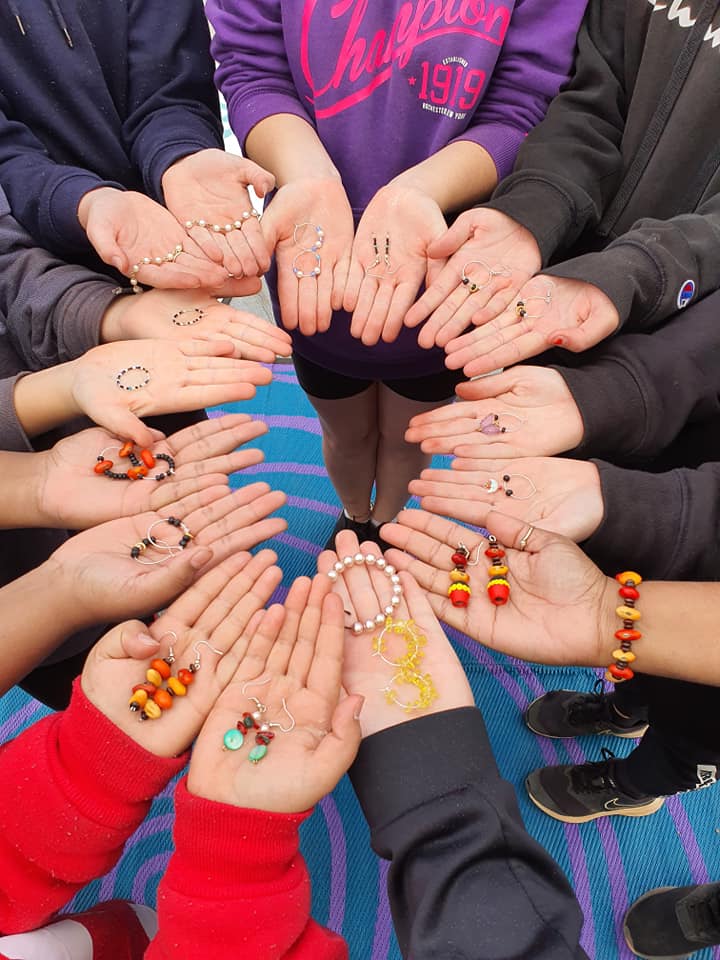
In Coorow, WA, a rural town 270 km north of Perth, the community had been shaken by a series of tragic mental health incidents.
The township has a population of just 200 and is the business and social hub for many small surrounding localities in an area dominated by farming. The agriculture industry in WA’s mid-west is changing, with businesses amalgamating so that the family farm is now often part of a larger enterprise. Businesses rely more on casual workers, reducing the local population and increasing isolation, due to greater distances between farming families.
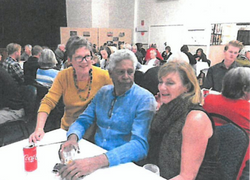
Coorow Community Resource Centre (CCRC) is a local organisation providing professional services to the community, and they clearly saw the need for more informal, activity-based gatherings to support the local community thorough a challenging time.
The In a Good Place program was the perfect fit to support this group in their aims. They successfully applied for a grant of $10,350, funded by CCI Giving, and got to work planning a series of motivational community dinners to encourage the Coorow community to come together for shared learning and social interaction.
The FRRR grant enabled the group to engage guests speakers for the ‘On Speaking Terms’ event – ordinarily the high cost of travel would reduce access to such talent, and guest speakers Peter Rowsthorn, Ernie Dingo and Karl O’Callaghan were a special drawcard to get the community together. The events were held at the Coorow District Hall in March, July and October 2019, on dates that worked within the local farming activities timetable for the people of the Shire of Coorow and surrounding shires of Perenjori, Carnamah and Moora.
Each event in the series also included presentations from mental health services in the region such as Wheatbelt Mens Health, Midwest Health service and the Desert Blue organisation. Dinners were catered by the CCRC and four school students from the area volunteered as wait staff. A ‘goodie bag’ was given to attendees to take away, including a Health Services in the area booklet compiled by the CCRC. The evenings were advertised and reported on by local newsletter, the Coorow Magpie Squawk.
Deborah Maley, Coordinater at CCRC said, “The Coorow CRC achieved everything we set out to with this program. We delivered three evenings with high profile speakers and had an amazing attendance to each and every one.
“Each speaker had a different way of putting forward their message and this meant that everyone could relate in different ways. All speakers created conversations within the attendees and also with the community as a whole.”
The group expected they might get 100 attendees to the event, but their smart plan enticed 224 people to attend the series, a remarkable outcome for a town of just 200 people. They have since reported that health agencies represented at the dinners have been contacted by community members following the info sessions, so they are hopeful that the message is reaching some of those local people that will benefit from mental health support.
In Coorow, WA, a rural town 270km north of Perth, the Coorow Community Resource Centre (CCRC) provides professional and friendly services to the community, from access to information through to community development, arts and culture, training and more.
The township has a population of 200 and is the business and social hub for many small surrounding localities in an area dominated by farming. The industry in WA’s mid-west is changing, with businesses amalgamating, so the family farm is now often part of a larger enterprise. Businesses rely more on casual workers, reducing the local population and having a flow on effect with isolation, as a result of there being greater distances between farming families.
The community had been shaken by a number of tragic mental health incidents, after which the CCRC saw the opportunity for more informal, activity-based gatherings to support the local community.
Coming together to support one another
Our In a Good Place program was the perfect fit to support this group in their aims. They successfully applied for a grant of $10,350, funded by CCI giving, and got to work planning a series of motivational community dinners to encourage the Coorow community to come together for shared learning and social interaction.
The FRRR grant enabled the group to engage guest speakers for the ‘On Speaking Terms’ event, helping cover the high cost of travel that often precludes bring well-known talent to the community. Guest speakers Peter Rowsthorn, Ernie Dingo and Karl O’Callaghan were a special drawcard to get the community together. Events were held at the Coorow District Hall in March, July and October 2019, on dates that worked within the local farming calendar for the people of the Shire of Coorow and surrounding shires of Perenjori, Carnamah and Moora.
Each event also included presentations from mental health services in the region such as Wheatbelt Mens’ Health, Midwest Health service and the Desert Blue organisation. Dinners were catered by the CCRC and four school students from the area volunteered as wait staff. A ‘goodie bag’ was given to attended to take away, including a Health Services in the area booklet compiled by the CCRC. The evenings were advertised and reported on by local newsletter, the Coorow Magpie Squawk.

An engaged community
In acquitting the grant, Deborah Maley, Coordinater at CCRC wrote, “The Coorow CRC achieved everything we set out to with this program. We delivered three evenings with high profile speakers and had an amazing attendance at each and every one.
“Each speaker had a different way of putting forward their message and this meant that everyone could relate in different ways. All speakers created conversations within the attendees and also with the community as a whole.”
The group estimated they might get 100 attendees to the event, but their smart planning and promotion enticed 224 people in total to attend the series, a remarkable outcome for a town of just 200 people. They have since reported that health agencies represented at the dinners have been contacted by community members following the information sessions, so they are hopeful that the message is reaching some of those local people that will benefit from mental health support.

